
-
Find the right food for your petTake this quiz to see which food may be the best for your furry friend.Find the right food for your petTake this quiz to see which food may be the best for your furry friend.Featured products
 Hill's Science Diet Adult Oral Care Chicken, Brown Rice & Barley Recipe Dog Food
Hill's Science Diet Adult Oral Care Chicken, Brown Rice & Barley Recipe Dog FoodClinically proven kibble technology to reduce plaque & tartar build-up
Shop Now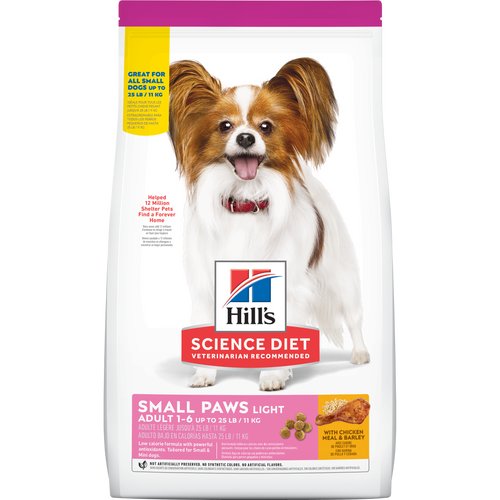 Adult Light Small Paws with Chicken Meal & Barley Dog Food
Adult Light Small Paws with Chicken Meal & Barley Dog FoodLow calories for less active small & mini dogs
Shop Now Adult Perfect Digestion Salmon, Whole Oats, and Brown Rice Recipe Dog Food
Adult Perfect Digestion Salmon, Whole Oats, and Brown Rice Recipe Dog FoodScience Diet's breakthrough nutrition supports ultimate digestive well-being & healthy microbiome
Shop NowFeatured products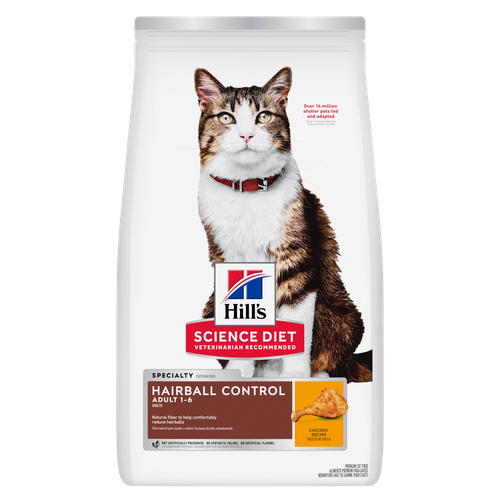 Adult Hairball Control Chicken Recipe Cat Food
Adult Hairball Control Chicken Recipe Cat FoodNatural fiber to help comfortably reduce hairballs
Shop Now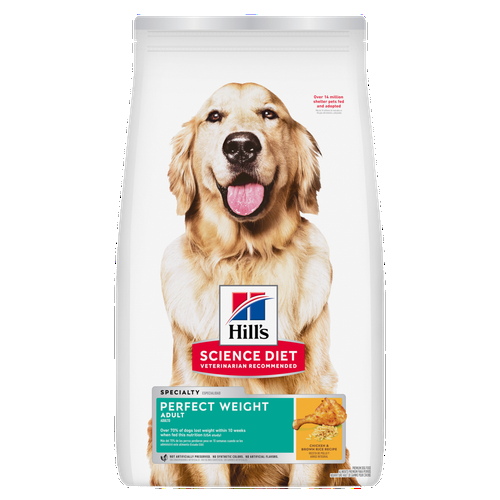 Adult Perfect Weight Chicken Recipe Dog Food
Adult Perfect Weight Chicken Recipe Dog FoodOver 70% of dogs lost weight within 10 weeks when fed this nutrition (USA Study)
Shop Now Adult 7+ Chicken Recipe cat food
Adult 7+ Chicken Recipe cat foodSupports energy level and beautiful fur in mature cats
Shop Now -
Dog
- Dog Tips & Articles
-
Health Category
- Weight
- Food & Environmental Sensitivities
- Urinary
- Digestive
- Joint
- Kidney
-
Life Stage
- Puppy Nutrition
- Adult Nutrition
- Senior Nutrition
Cat- Cat Tips & Articles
-
Health Category
- Weight
- Skin & Food Sensitivities
- Urinary
- Digestive
- Kidney
-
Life Stage
- Kitten Nutrition
- Adult Nutrition
Featured articles How to Reduce Your Pet's Carbon Paw Print
How to Reduce Your Pet's Carbon Paw PrintHeaded outside? How you and your pets engage with nature can affect the environment, so here are some quick tips for reducing your pet's carbon paw print.
Read More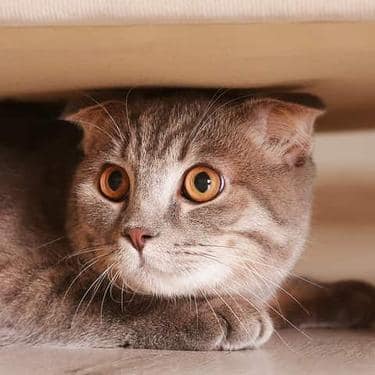 Keeping Pets Calm During Thunderstorms
Keeping Pets Calm During ThunderstormsIs your dog scared of thunder? Does your kitty dart under the bed at the first rumble? Learn a few tips for keeping your pets calm during the storm.
Read More Moving With a Pet: A How-To Guide
Moving With a Pet: A How-To GuideDiscover helpful tips for moving with your pet including safety recommendations to keep in mind on moving day & pet behavior to watch for at your new home.
Read More -


What are gastrointestinal and digestive disorders?
Any disorder that reduces the digestion or absorption of food, or alters its passage through the digestive tract, can be called a digestive disorder. Gastrointestinal (GI) disorders affect a cat's stomach and intestines, resulting in pain and other problems. Efficient digestion is essential for your cat to be able to build and repair tissues and obtain energy.
Digestive disorders in cats are quite common and most clear up within a few days. But some cats need long-term management because they have regular or permanent digestive problems. GI disorders can lead, to dehydration, acid-base and electrolyte imbalances and malnutrition so it is important to recognize the signs and consult with your veterinarian.
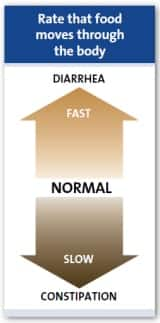
What are the types and causes of digestive disorders?
There are many different types of digestive disorders. The causes of digestive disorders range from eating something other than cat food, to food intolerance or sensitivities, infections, or lack of digestive enzymes. Some cat breeds such as Sphynx, Rex and Ragdoll, are more prone to particular digestive problems. Your veterinarian may carry out tests to determine the exact cause of your cat’s GI problem.
Commonly diagnosed conditions include:
Acute gastroenteritis: An inflamed digestive tract, usually short-term. Causes may include eating rancid or spoiled food, swallowing foreign objects, eating toxic plants, internal parasites, stress, food allergies and some disease conditions.
Colitis: More common in cats under the age of 5, colitis causes inflammation of the large intestine that results in frequent, painful passing of feces. If your cat is experiencing colitis, it may contain mucus and blood. Most frequently, colitis is caused by tumors or polyps, a change in food, allergies (including those to food), swallowed foreign objects and certain other diseases.
Diarrhea: Caused by infections, internal parasites, stress, a change in cat food, table scraps or rich snacks, eating spoiled food from the garbage and body organ dysfunction.
Constipation: Usually caused by dehydration, insufficient fiber intake, ingesting hair or other foreign objects, aging, tumors, trauma or fractures, spinal cord disease, large bowel nervous disorders, metabolic or endocrine disorders and debilitation, and lack of exercise.
Pancreatitis: An inflammation or infection of the pancreas (an elongated, tapered gland that is located behind the stomach). Origins are frequently unknown. Potential causes are decreased blood flow (due to dehydration, or other disease processes) infections, disease or trauma.
Irritable Bowel Syndrome: Commonly associated with chronic inflammation and discomfort of a cat’s bowels, but is typically not directly linked to gastrointestinal disease. Some suspected causes include food intolerances and the ability of the cat food to effectively pass through the gastrointestinal tract. Mental distress can also be a contributing factor for this condition.
Exocrine pancreatic insufficiency: This condition is characterized by weight loss, increased appetite and large amounts of soft feces. Chronic pancreatitis is the most common cause.


Tasty Tips
Small intestinal malabsorption: Inflammation of the small intestine impairs nutrient absorption and results in persistent diarrhea, weight loss and loss of appetite in your cat.
Does my cat have a gastrointestinal or digestive disorder?
The most common signs of digestive disorders in cats are soft stools or diarrhea. You may also notice some or all of the following signs in your cat.
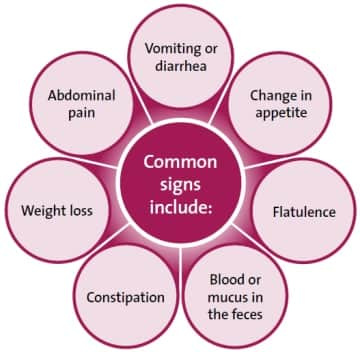
- Vomiting
- Regurgitation
- Flatulence
- Weakness
- Diarrhea/constipation
Chronic GI disease can be a debilitating problem for many cats and requires testing and a thorough diagnosis from your veterinarian.
IMPORTANT: If your cat has diarrhea or is vomiting, she may become severely dehydrated. Consult your veterinarian if you notice any of these signs.
Treatment: The importance of nutrition
Your cat's food can have a significant impact on her GI tract health. A number of different nutritional approaches could be recommended for your cat depending on the specific diagnosis and the symptoms. The main goal is to alleviate your cat’s signs/symptoms of vomiting and/or diarrhea. Veterinarians recommend feeding cats with this condition a food that is highly digestible to help prevent irritation to her sensitive stomach and intestines. Also, high-soluble and insoluble fiber foods combined with moderate fat levels help support proper intestinal function. It is also important to monitor your cat’s hydration during the recovery phase to help ensure she has enough water and correct any fluid deficiencies.
Because several of these gastrointestinal conditions may be ongoing, long-term nutritional management of the disorder may be required. For accurate diagnosis and treatment options, always consult your veterinarian and ask them to recommend the best food for your cat’s digestive health.
Digestive Health Questions to Ask Your Veterinarian:
- Are there any foods I should avoid giving my cat to ensure a healthy digestive system?
- Ask how human food (such as chocolates or candy) can affect your cat’s health.
- Would you recommend a Hill’s® Prescription Diet® or Science Diet® cat food for my cat’s digestive health?
- Ask about special nutritional concerns for your cat
- How much / how often you should feed the recommended food to your cat
- Discuss treats you can feed your cat with the recommended food
- Would you recommend a Hill’s® Prescription Diet® or Science Diet® cat food for my cat’s digestive health?
- How quickly should I expect to see signs of improvement in my cat’s condition?
- Can you provide me with written instructions or a handout on digestive health?
- What is the best way (email/phone) to reach you or your hospital if I have questions?
- Ask if you need a follow-up appointment.
- Ask if a reminder email or notice will be sent.
- Would you recommend a Hill’s® Prescription Diet® or Science Diet® cat food for my cat’s digestive health?


One of our staff authors prepared this article for you
Related products

Over 70% of dogs lost weight within 10 weeks when fed this nutrition (USA Study)

Natural fiber to help comfortably reduce hairballs
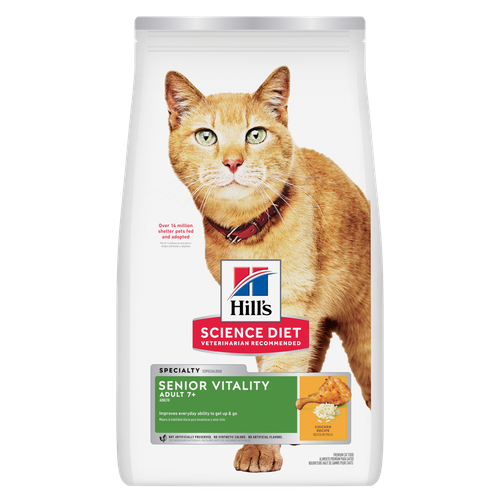
Improves Everyday Ability to Get Up & Go

Supports energy level and beautiful fur in mature cats
Related articles
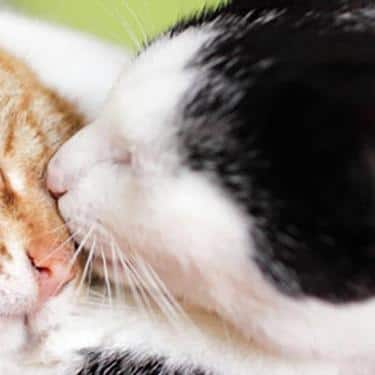
Learn the different factors that might be contributing to your cat's weight gain, and how bigger doesn't always mean better.

Discover how to identify cat sensitive skin and what you can do to help your cat thrive from head to paw.
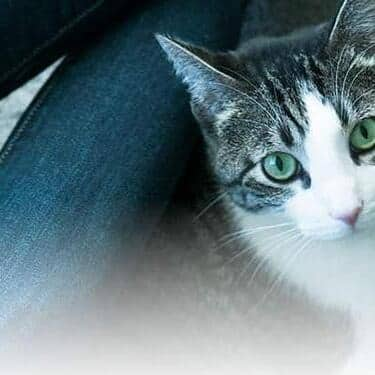
Brushing your cat's teeth is just as important as brushing your own. Learn signs or oral health problems in your cat and how to avoid them.

What is the best food for an overweight cat? Learn all about weight control food for cats, including what's in it and how it works.

Put your cat on a diet without them knowing
Our low calorie formula helps you control your cat's weight. It's packed with high-quality protein for building lean muscles, and made with purposeful ingredients for a flavorful, nutritious meal. Clinically proven antioxidants, Vitamin C+E, help promote a healthy immune system.
Put your cat on a diet without them knowing
Our low calorie formula helps you control your cat's weight. It's packed with high-quality protein for building lean muscles, and made with purposeful ingredients for a flavorful, nutritious meal. Clinically proven antioxidants, Vitamin C+E, help promote a healthy immune system.

